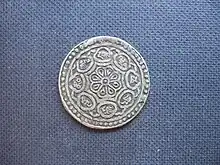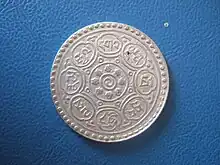The Money Portal
Euro coins and banknotes
Money is any item or verifiable record that is generally accepted as payment for goods and services and repayment of debts, such as taxes, in a particular country or socio-economic context. The primary functions which distinguish money are: medium of exchange, a unit of account, a store of value and sometimes, a standard of deferred payment. Money was historically an emergent market phenomenon that possessed intrinsic value as a commodity; nearly all contemporary money systems are based on unbacked fiat money without use value. Its value is consequently derived by social convention, having been declared by a government or regulatory entity to be legal tender; that is, it must be accepted as a form of payment within the boundaries of the country, for "all debts, public and private", in the case of the United States dollar. The money supply of a country comprises all currency in circulation (banknotes and coins currently issued) and, depending on the particular definition used, one or more types of bank money (the balances held in checking accounts, savings accounts, and other types of bank accounts). Bank money, whose value exists on the books of financial institutions and can be converted into physical notes or used for cashless payment, forms by far the largest part of broad money in developed countries. (Full article...) Selected article -A currency is a standardization of money in any form, in use or circulation as a medium of exchange, for example banknotes and coins. A more general definition is that a currency is a system of money in common use within a specific environment over time, especially for people in a nation state. Under this definition, the British Pound sterling (£), euros (€), Japanese yen (¥), and U.S. dollars (US$) are examples of (government-issued) fiat currencies. Currencies may act as stores of value and be traded between nations in foreign exchange markets, which determine the relative values of the different currencies. Currencies in this sense are either chosen by users or decreed by governments, and each type has limited boundaries of acceptance; i.e., legal tender laws may require a particular unit of account for payments to government agencies. Other definitions of the term currency appear in the respective synonymous articles: banknote, coin, and money. This article uses the definition which focuses on the currency systems of countries. (Full article...)Selected currency -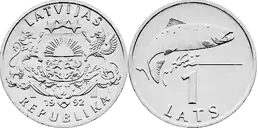 The Latvian lats (plural: lati, plural genitive: latu, second Latvian lats ISO 4217 currency code: LVL) was the currency of Latvia from 1922 until 1940 and from 1993 until it was replaced by the euro on 1 January 2014. A two-week transition period during which the lats was in circulation alongside the euro ended on 14 January 2014. The lats is abbreviated as Ls and was subdivided into 100 santīmi (singular: santīms; from French centime), abbreviated as an s after the santīm amount. The Latvian lats has been recognized as one of the 99 entries of the Latvian Culture Canon. (Full article...)Did you know -
Related portalsGet involvedFor editor resources and to collaborate with other editors on improving Wikipedia's Money-related articles, see WikiProject Numismatics. Need help?Do you have a question about Money-related content on Wikipedia that you can't find the answer to? Consider asking it at the Wikipedia reference desk. General images - The following are images from various currency-related articles on Wikipedia.
In the news
CategoriesSelect [►] to view subcategories
Category puzzle Money Monetary lists Currency lists Finance lists Lists of most expensive things Numismatics-related lists Lists of salaries Cash Cash flow Finance Finance by country Finance by continent Fields of finance Finance by subject Finance lists Catholic Church and finance Financial charts Financial data analysis Financial districts History of finance Financial law Finance ministries Finance occupations Financial problems Financial ratios Financial risk Financial services Financial systems Financial technology Works about finance Finance stubs History of money History of British coinage History of currency Numismatics History of the English penny Liability (financial accounting) Accounts payable Debt Monarchy and money no subcategories Monetary economics Demand for money Monetary economists Financial crises Inflation Interest rates Metallism Modern monetary theory Monetary policy Money containers no subcategories Money forgery Counterfeit money Counterfeiters Fugitives wanted on counterfeiting charges Works about money forgery Payments Compensation for victims of crime Fines Free goods and services Household income Settlement (finance) Subsidies Payment systems Tax Payment terms Trade coins no subcategories Money stubs Currency stubs Finance stubs Topics– By region –
– By name –
– By country –
– Historical currencies –
– Other –
WikimediaThe following Wikimedia Foundation sister projects provide more on this subject:
SourcesMore portalsDiscover Wikipedia using portals
|
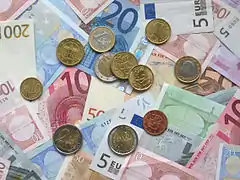
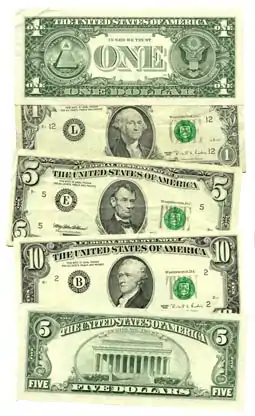

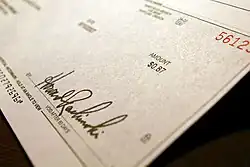





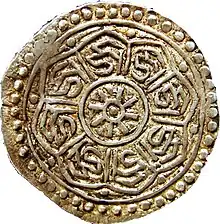

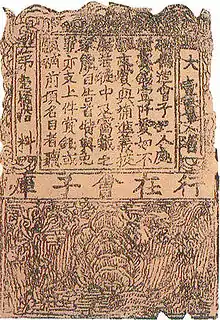



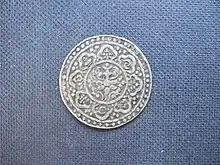
.jpg.webp)
.jpg.webp)

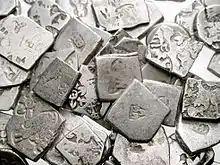

.jpg.webp)





